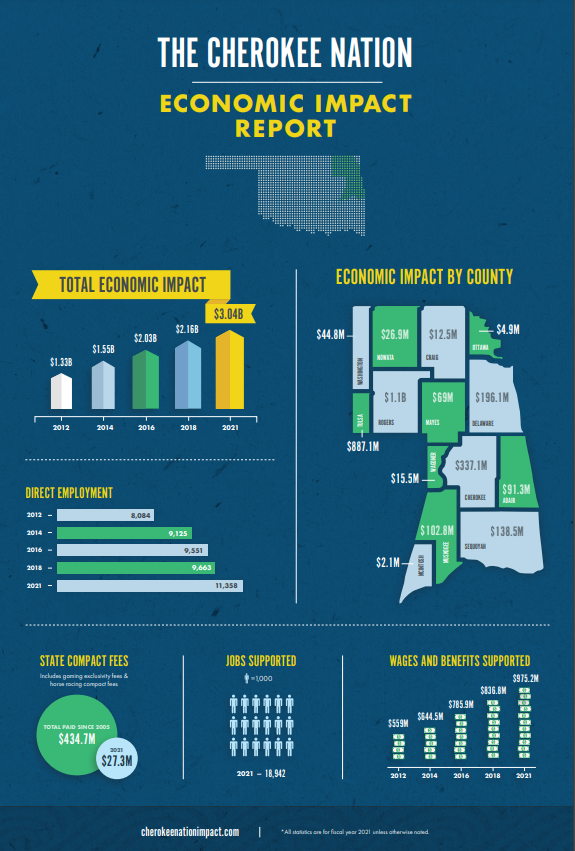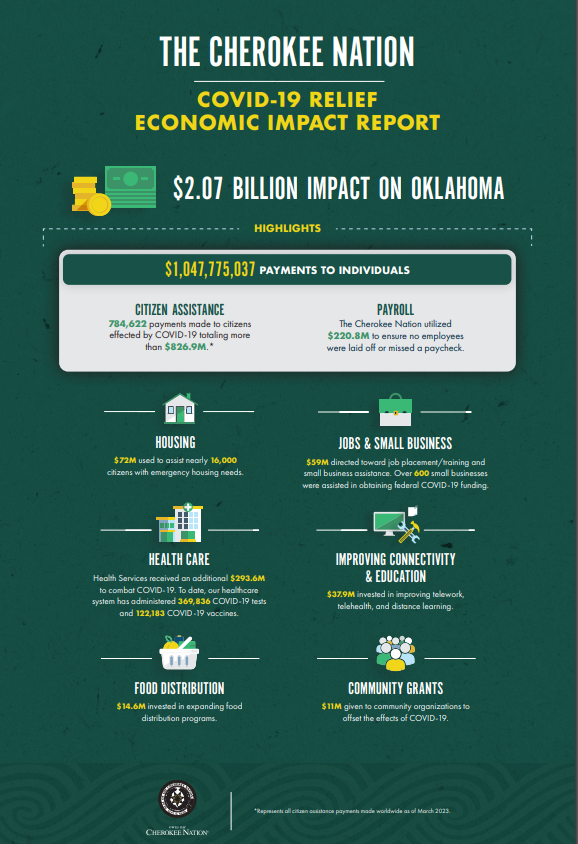
Tribe brings significant economic support to northeast Oklahoma
TULSA, Okla. — Cherokee Nation now drives more than $3.04 billion annually into the Oklahoma economy. The tribe and its businesses continually expand opportunities and advantages throughout northeast Oklahoma by supporting education, growing industries, providing jobs, improving health care, building infrastructure and more.

“Today, we gather to recognize the tremendous economic impact that Cherokee Nation has on northeast Oklahoma. From job creation to infrastructure development, Cherokee Nation plays a vital role in driving the region’s economic growth and prosperity,” said Cherokee Nation Principal Chief Chuck Hoskin Jr. “The economic impact of Cherokee Nation in Oklahoma cannot be overstated. Through our businesses, educational offerings, health care expansion and community partnerships, we continue to enrich the Oklahoma economy and enhance the quality of life of our citizens, as well as our friends and neighbors."

An economic impact report by Dr. Russell Evans, principal of the Economic Impact Group and executive director of Economic Research and Policy Institute at Oklahoma City University, shows the tribe remains one of the state’s biggest economic drivers through investments, employment, labor income, and local production of goods and services.
In an addendum to the report, research shows that Cherokee Nation’s COVID-19 relief funding has generated an additional $2.07 billion economic impact in Oklahoma. To date, the tribe has used $826.9 million of its federal COVID-19 relief funding to provide direct assistance payments to Cherokee citizens affected by the pandemic, including $552 million made directly to Cherokee citizens residing in Oklahoma.

“As the Oklahoma economy began to emerge from the long shadows of the pandemic, the Cherokee Nation was a leader in growing opportunities in northeast Oklahoma. Cherokee Nation kept payrolls full, provided needed hazard pay to frontline workers and expanded trade with thousands of vendors,” said Evans. “The significant economic influence of the tribe was supplemented by the nearly $1.5 billion in pandemic relief funds allocated in the state, with more than half of those funds providing direct assistance to Cherokee citizens and payroll to employees.”
The study shows Cherokee Nation either directly or indirectly supports more than 18,900 jobs and $975 million in wages throughout northeast Oklahoma. The tribe’s direct economic footprint includes more than $1.96 billion in purchases, operations and activities.
Tribal officials joined Russell in presenting his team’s findings during a forum breakfast held at The University of Tulsa with business executives, educators, industry leaders, and several state, county and local officials in attendance. During the forum, officials announced a partnership between the Cherokee Nation, The University of Tulsa’s Collins College of Business and Stichcrew that will offer a Native American Women Entrepreneur Accelerator to Cherokee women this fall.
“As a proud Cherokee myself, we at TU are grateful for the significant impact the Cherokee Nation has on the Oklahoma economy,” said TU President Brad R. Carson. “The success of the Cherokee Nation makes Tulsa and our state stronger and more successful too.”

Cherokee Nation, the largest sovereign tribal government in the U.S., provides an array of services, including health care, career services, human services, education and housing. The tribe also makes significant investments in roads, bridges, transportation, housing, public water and sanitation systems.
During 2021, the fiscal year studied by the economists, the tribe built or repaired nearly 91 miles of road, installed 17.1 miles of water lines and completed 672 water improvement projects. Cherokee Nation also delivered more than 146,000 meals to elders, provided 3,155 low-income households with heating and energy assistance, provided $19.6 million in scholarships to students, and provided $7.4 million in contributions of car tag revenues to public schools across northeast Oklahoma.
Cherokee Nation Businesses, the tribe’s corporate holding company, has a diverse business portfolio. CNB owns companies in federal contracting, tourism, hospitality and entertainment, while also serving as drivers of community development and cultural preservation.
“As our businesses continue to grow and succeed, so does our ability to further support the tribe and remain a positive community partner for our local communities and state,” said Chuck Garrett, chief executive officer of Cherokee Nation Businesses. “Cherokee Nation and CNB have long remained a great community partner, and we are here to stay. I can assure you we will continue doing our part in creating substantial economic growth and jobs, while expanding opportunities and helping make northeast Oklahoma a great place to call home.”

Throughout the last two years, the continued success of the tribe’s business arm led to more than $316 million paid as a cash dividend to the Cherokee Nation for tribal services and programs. The remainder of CNB’s income is reinvested into job creation, as well as business development and diversification.
The report was commissioned by the Cherokee Nation and produced by Evans. The Oklahoma City-based research team carefully collected and reviewed data to ensure Cherokee Nation’s impact on the state is accurately presented. Studies of Cherokee Nation’s economic impact on northeast Oklahoma have been conducted since 2010.
For more information, please visit www.cherokeenationimpact.com.







